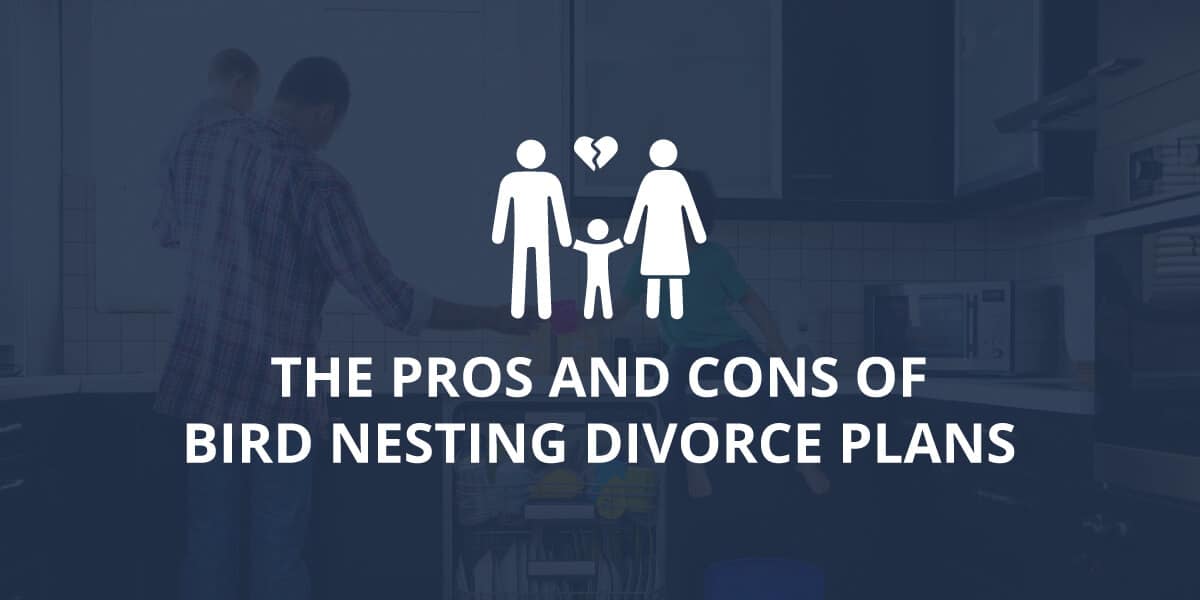The Pros and Cons of Bird Nesting Divorce Plans

Divorce has become more common over the years, and there’s a lot more research on how it impacts the children. A contentious divorce is traumatic for young children and teens. Many parents are becoming more mindful of how they handle the divorce process as a result, which is why some parents are choosing “bird nesting” over a sudden and full separation.
Birds nesting, or simply nesting, is the practice of maintaining a family residence where both parents rotate living with their children. The kids always stay in one place. But their parents take turns living between the family home and their own residences or another shared space—depending on their finances and what they’re comfortable with.
Parents who choose to bird nest still have to decide on a child custody arrangement and parenting plan. The time they spend in the home might be 50/50, or it might not.
Before you decide to nest during your divorce, it’s important to understand the possible benefits and disadvantages. Nesting isn’t the right solution for everyone. We recommend talking with a Boston family law and divorce attorney from Infinity Law Group before deciding your living arrangements.
The Pros of Bird Nesting
Emotional and Practical Stability
Bird nesting minimizes the changes for children. Where they sleep, eat meals, do their homework, and play stays the same, even if their parents aren’t both home at the same time. This gives children stability during a difficult transition. Lawyer and mediator Hadassah Fidler pointed out that a sense of routine for the children can be helpful during the transition.
Nesting gives everyone time to come to terms with the divorce and plan a transition that considers practical changes. The children will eventually have two sets of everything. They’ll need to know what they take back and forth to each home. You can talk with your children about these upcoming changes during your months of nesting.
Separate homes impact children’s social lives. By not moving right away, you and your children can anticipate how to disrupt their children’s social lives as little as possible in the future.
Collaboration
When you choose to bird nest while going through an amicable divorce, you can show your children that it’s possible to work together. The children see you’re still able to work as a team and get along, even if you can’t remain married.
Cost-Effective
There can be financial benefits to nesting, according to divorce mediator Joe Dillon. Many parents choose to rent a simple studio or one-bedroom to share when not with their children. Paying for the family home and a frugal apartment can be more cost-effective compared to each of you maintaining a home or apartment that fits your and the kids. Learn how to handle rental properties during a divorce.
It can be helpful to hold onto the house for a little while longer. It might not be the right time to put the house on the market. Bird nesting gives you time to decide how to handle the home and if you choose to sell when to place it on the market.
The Cons of Bird Nesting
Confusion and Anxiety
Too much of a good thing can become a bad thing. Sherri Sharma, the partner at Aronson, Mayefsky & Sloan, LLP, told NBC News that nesting seems to work best for her clients in the short term. For periods beyond six months, children can start to get confused and become anxious.
A longer period of nesting might create false hope of reconciliation in the children, said Dr. Fran Walfish, a family and relationship psychotherapist said to NBC News.” You don’t want to nest for so long that your children start to expect you to get back together.
Potential Conflict
A disadvantage of nesting during a divorce is the potential for conflict. There are reasons you and your spouse decided to move forward separately. Continuing to share the family home can bring up a lot of arguments.
There also is the issue of privacy. You or the other parent might be ready to move on romantically. This raises a lot of questions. Are significant others allowed in the family home? Can they spend time with the children, but not sleepover? What about in the other shared spaced?
Commingled Finances
Nesting can be tough financially, as well. If money troubles are part of the reason for the divorce, trying to decide how to share the expenses for the family home can be a bone of contention. Also, if a spouse has financially exploited or abused another, remaining financially entangled with shared property isn’t appropriate.
You should take a serious look at the financial ramifications of continuing to share the family home. You two must be on the same page as to how to pay for it and the separate residence. You also have to consider the tax ramifications if you plan to file separately.
Child support calculations can be complicated, as well. Courts are used to calculating support based on two different households. You and your spouse might need to negotiate a child support figure that makes sense and will be approved by the court.
Talk with a Boston Divorce Lawyer Before Bird Nesting
Before you and your spouse decide to bird nest during and after a divorce, talk with an experienced attorney at Infinity Law Group. We can go over the potential advantages and disadvantages of this type of co-parenting arrangement. We also can learn more about your relationship with your spouse and advise you on whether nesting is a good idea.
To reach our main office in Quincy, MA, call (617) 250-8236. Or use our online contact form to schedule a free initial consultation.
 Infinity Law Group LLC
Infinity Law Group LLC





